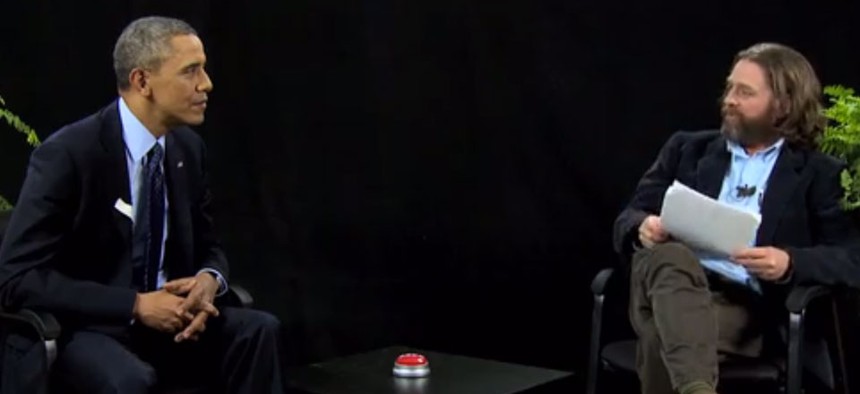
Funny or Die
Between Two Ferns: The Selling of the President, 2014
It's ironic that the Barack Obama's appearance on the series coincides with the death of Joe McGinniss, an early chronicler of the political-entertainment nexus.
President Obama stormed the internet Tuesday with his appearance on Zach Galifianakis's beloved series Between Two Ferns.
There are (in my opinion) some solidly entertaining moments here, but of course Obama's reason for appearing is to work on selling Healthcare.gov and the Affordable Care Act. And of course, reactions to the video have mostly split along predictable lines—mainstream and liberal media swoon, conservatives scoff.
Some detractors complain that Obama has serious work to do and oughtn't to be gallivanting around with Hangover stars. Claims like this are more complex than they initially appear. On the one hand, Obama has often privileged popular media—late-night TV, comedians, etc.—over the working press. For the White House, that's strategically sound: The traditional media's whingeing about it won't win much sympathy, and Jimmy Fallon isn't going to ask questions as aggressive as, say, Jake Tapper or Charlie Savage . Besides, the traditional media has often failed to take the opportunities they get, as Conor Friedersdorf has pointed out . All that said, it's clearly important for the functioning of democracy for leaders to be subject to adversarial questioning, which Galifianakis clearly isn't delivering.
On the other hand, part of the president's job is to communicate, and that's what he's doing here: trying to reach a specific audience. It happens that the law in question, the Affordable Care Act, is politically contentious, which accounts for the backlash; but it also happens that it's the law of the land, and educating citizens about it can hardly be a dereliction of duty. It's too soon for us to judge whether Obama's fondness for non-traditional media is an anomaly; complaining that Obama spends more time on internet video than his predecessors is a little like complaining that Calvin Coolidge spent more time on radio addresses than Warren Harding. True as far as it goes, but ...
Sonny Bunch complains that comedians just aren't ready to fight The Man like they used to. Perhaps—though the fact that comedians of the 1960s and 1970s eagerly attacked Lyndon Johnson and Richard Nixon is a strangely policy-agnostic vision of history. Of course they were willing to attack (say) Johnson's handling of the Vietnam War—they disagreed with it! Yes, Galifianakis agrees with Obama politically. But where does this complaint lead? To the conclusion that comedians must only take positions that are critical of power, and that they can't make an affirmative case for a policy (say, expanded healthcare) they believe in? That would be a peculiar and perhaps destructive way of policing the legitimacy of a public figure's views. Galifianakis may be wrong , from a conservative standpoint, on the policy, but that ought not to make his politics ipso facto illegitimate.
Yet there is an irony that Obama's Between Two Ferns appears the same day as obituaries for Joe McGinniss , the author who died Monday. Though he was best known recently, for moving in next door to Sarah Palin , McGinniss's breakout book was The Selling of the President 1968 , the story of how Richard Nixon's campaign used savvy media techniques to make a dour, dull, and tired contender into a winning candidate. It was during that campaign that Nixon made his unintentionally hilarious appearance on Laugh-In , the template for later political forays into humor.
Perhaps McGinniss would appreciate the coincidence. “It has all become entertainment,” he told the New York Times in 2010. “In the 21st century, politics is just another branch of the entertainment industry.” That was the logical end of what he'd described in his Nixon book, of course, and it also describes Obama's melding of political salesmanship and celebrity humor. But The Selling of the President is a cautionary tale, too. Nixon's team sold him to the American people, twice. So did Obama's team. No, there's no reason to expect the current president to leave office in Watergate-style disgrace, but Nixon's story is a reminder that slick media-messaging can only boost a president so far.
NEXT STORY: Not All Good Leaders Are Bossy






